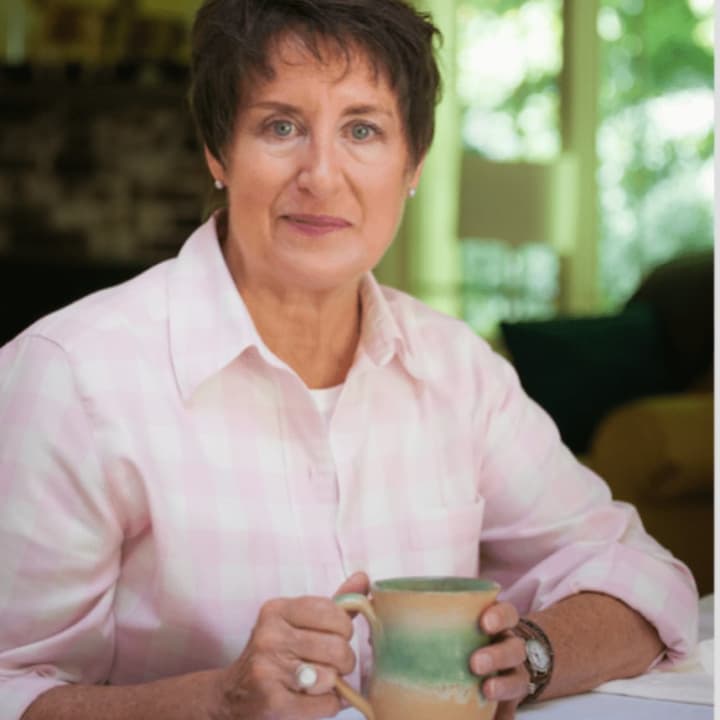And now Rhodes is bringing awareness to a non-invasive treatment for depression called Transcranial Magnetic Stimulation, or TMS, that worked for her when medications did not.
TMS is a type of therapy that uses magnetic pulses to stimulate nerve centers in the brain that regulate mood. It has relieved Rhodes' depression symptoms — medication free — for over six years.
In her recently published memoir, "3,000 Pulses Later," Rhodes describes her challenges with undiagnosed and untreated, drug-resistant depression and her success with TMS.
The book tells the story of how, after 25 years as a top New York City advertising executive, Rhodes took an overdose of Xanax and alcohol in an unsuccessful suicide attempt to escape her feelings of depression.
It chronicles her struggle to find an alternative to the antidepressants she had been taking for years that not only failed to relieve her symptoms, but also left her feeling sick from their many side effects.
"When I was in my 40s, I had my first diagnosis for depression and prescription for an anti-depressant," recalled Rhodes, a mother of two and grandmother of three.
"Even while I was taking the anti-depressants, I always had an undercurrent of sadness and despair," she said. "Although I assumed the medications were working, in fact, they weren't."
In addition, she said, she struggled with side effects such as being awake for over 60 hours at a time, weight gain, personality changes, fits of rage, nausea, dizziness and excessive sleeping.
"I consider depression to be a cancer of the soul because it feels like it's eating your spirit," said Rhodes, 67, recalling her feelings during this dark period in her life.
It wasn't until the fourth or fifth trial of prescription drugs that she discovered she was medication resistant.
During the process of trying different medications, she said she felt ashamed of her feelings of depression. "I thought, 'What in the world do I have to be depressed about? I have a great husband, family and job. I have such a great life.'
"This shows you how dangerous this illness is," she said. "The depression had taken over."
In 2010, when she first decided to try TMS, she felt she had nothing to lose. "Nothing else worked. It was non-invasive and FDA-approved. There were no side effects. I knew I needed to give this a try," she said.
Treatment involves sitting in a spa-like chair and watching television with the TMS device placed against her scalp. "It’s attached to a computer that monitors dosage and safety. The pulses feel like a woodpecker on my head.
"They penetrate the skull and when they hit the neurons, a little electrical current is created from the magnetic pulse that stimulates them so that they’ll do their job of keeping me well.
"TMS is a cumulative process -- it took me getting treatments for five days a week for four weeks to have a positive effect, but the research-recommended course of treatment is six weeks," she said.
"What is so wonderful about TMS is instead of taking a pill that affects some of your organs, the application of magnetic pulses that you receive during TMS goes directly to the brain so none of your other organs are affected. Your brain is targeted directly and awakened with no side effects.
"After the 19th treatment of TMS, I remember waking up on a Saturday morning and the light in the room looked different. I thought, 'Something is missing.' That disgusting emotional nausea lifted. The dark cloud went away. I continued for another two weeks and went into full remission."
Since her remission, Rhodes has become an advocate for TMS patients from as far as Australia, South Africa, Europe, South America, and Canada. She has appeared on ABC-TV, The Daily BUZZ TV, Fox News TV, and Sirius Radio.
"Currently, there are over 600 TMS centers in this country. Over 1 million TMS treatments have been administered with a 58 percent response rate and 37 percent remission rates," she said.
"Depression must be recognized as a chronic, physical illness and not a personality flaw. My brain isn't providing the chemicals that keep me healthy.
"With my book, I want people to be aware of treatment-resistant depression and to realize there is an alternative that is proven safe and effective."
For more information on Martha Rhodes and to purchase her book, click here.
Click here to follow Daily Voice Danbury and receive free news updates.



